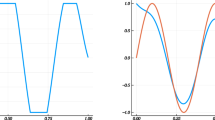Abstract
In this paper we study stability of optimal solutions of stochastic programming problems with fixed recourse. An upper bound for the rate of convergence is given in terms of the objective functions of the associated deterministic problems. As an example it is shown how it can be applied to derivation of the Law of Iterated Logarithm for the optimal solutions. It is also shown that in the case of simple recourse this upper bound implies upper Lipschitz continuity of the optimal solutions with respect to the Kolmogorov—Smirnov distance between the corresponding cumulative probability distribution functions.
Similar content being viewed by others
References
J.F. Bonnans and A.D. Ioffe, “Second-order sufficiency and quadratic growth for non isolated minima,” preprint, 1993.
J.V. Burke and M.C. Ferris, “Weak sharp minima in mathematical programming,” Computer Sciences Technical Report 1050, University of Wisconsin-Madison, 1991.
F.H. Clarke,Optimization and Nonsmooth Analysis (Wiley, New York, 1983).
J. Dupačová, “Stability and sensitivity analysis for stochastic programming,”Annals of Operations Research 27 (1990) 115–142.
J. Dupačová and R.J.B. Wets “Asymptotic behavior of statistical estimators and of optimal solutions of stochastic optimization problems,”The Annals of Statistics 16 (1988) 1517–1549.
N. Gröwe and W. Römisch, “A stochastic programming model for optimal power dispatch: stability and numerical treatment,” in K. Marti ed.,Stochastic Optimization: Numerical Methods and Technical Applications, Lecture Notes in Economics and Mathematical Systems (Springer, Berlin, 1992) pp. 111–139.
P. Kall,Stochastic Linear Programming (Springer, Berlin, 1976).
A.D. Ioffe and V.M. Tihomirov,Theory of Extremal Problems (North-Holland Publishing Company, Amsterdam, 1979).
S.M. Robinson, “Generalized equations and their solutions, Part II: applications to nonlinear programming,”Mathematical Programming Study 19 (1982) 200–221.
S.M. Robinson and R.J.B. Wets, “Stability in two-stage stochastic programming,”SIAM Journal on Control and Optimization 25 (1987) 1409–1416.
R.T. Rockafellar,Convex Analysis (Princeton University Press, Princeton, NJ, 1970).
R.T. Rockafellar and R.J.B. Wets, “On the interchange of subdifferentiation and conditional expectation for convex functionals,”Stochastics 7 (1982) 173–182.
W. Römisch and R. Schultz, “Distribution sensitivity in stochastic programming,”Mathematical Programming 50 (1991) 197–226.
W. Römisch and R. Schultz, “Stability of solutions for stochastic programs with complete recourse,”Mathematics of Operations Research 18 (1993) 590–609.
R.J. Serfling,Approximation Theorems of Mathematical Statistics (Wiley, New York, 1980).
A. Shapiro, “Asymptotic analysis of stochastic programs,”Annals of Operations Research 30 (1991) 169–186.
A. Shapiro, “Perturbation analysis of optimization problems in Banach spaces,”Numerical Functional Analysis and Optimization 13 (1992) 97–116.
J. Wang, “Distribution sensitivity analysis for stochastic programs with complete recourse,”Mathematical Programming 31 (1985) 286–297.
R.J.B. Wets, “Stochastic programs with fixed recourse: The equivalent deterministic program,”SIAM Review 16 (1974) 309–339.
R.J.B. Wets, “Stochastic programming: Solution techniques and approximation schemes,” in A. Bachem, A. Grötschel and B. Korte, ed.,Mathematical Programming. The State of the Art (Springer, Berlin, 1983) pp. 566–603.
B.B. Winter, “Convergence rate of perturbed empirical distribution functions,”Journal of Applied Probability 16 (1979) 163–173.
Author information
Authors and Affiliations
Rights and permissions
About this article
Cite this article
Shapiro, A. Quantitative stability in stochastic programming. Mathematical Programming 67, 99–108 (1994). https://doi.org/10.1007/BF01582215
Received:
Revised:
Issue Date:
DOI: https://doi.org/10.1007/BF01582215



